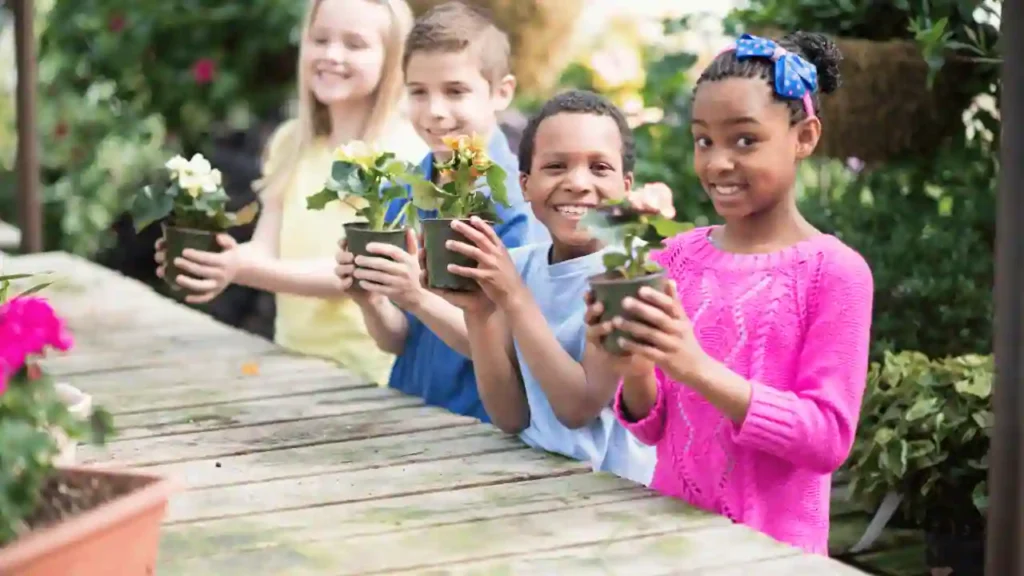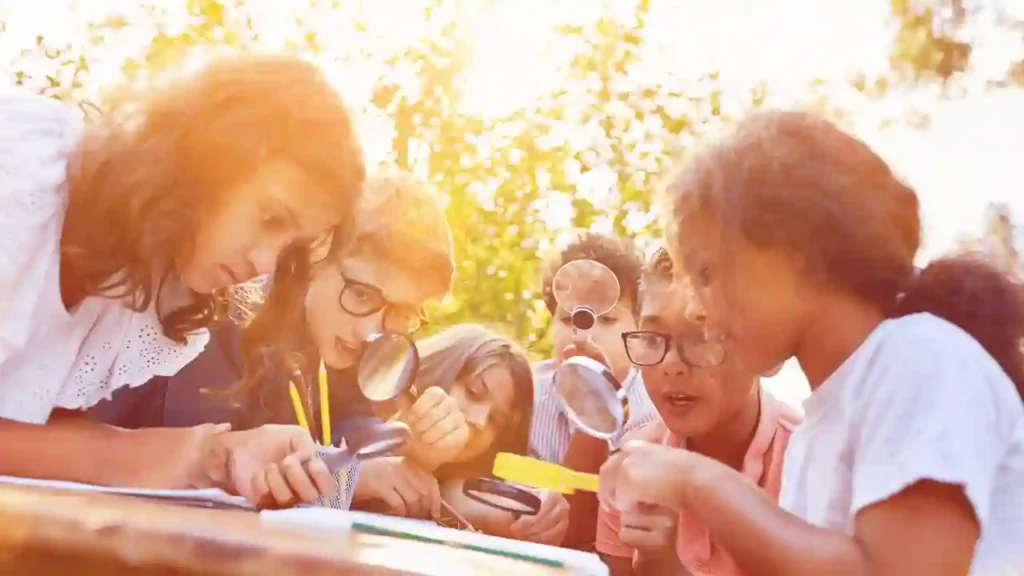Amidst the hustle and bustle of modern life, where screens often take centre stage in children’s routines, there’s a growing realization of the value of reintroducing them to the wonders of nature. Nature-based learning, which seamlessly blends outdoor adventures and environmental teachings into educational frameworks, is increasingly celebrated for its multitude of advantages, particularly in nurturing children’s cognitive growth.
Understanding Nature-Based Learning:
Nature-based learning, also known as outdoor or environmental education, involves hands-on experiences in natural settings such as parks, forests, and gardens. It encompasses various activities, including nature walks, gardening, wildlife observation, and outdoor exploration. Unlike traditional classroom settings, nature-based learning encourages children to engage with their surroundings actively, fostering curiosity, creativity, and a deeper connection to the natural world.

Cognitive Development in Children:
Cognitive development refers to the process of acquiring knowledge, understanding, and problem-solving abilities. It encompasses various aspects, including perception, memory, attention, language, and reasoning skills. During childhood, the brain undergoes significant growth and development, making this period crucial for shaping cognitive abilities that lay the foundation for lifelong learning.
Benefits of Nature-Based Learning on Cognitive Development:
Nature-based learning offers a rich and dynamic environment for promoting cognitive development in children. Here are some ways in which nature education enhances cognitive skills:
Enhanced Problem-Solving Skills:
Nature-based activities often present children with real-world problems and challenges to solve. Whether it’s building a shelter, navigating a trail, or identifying plant species, these experiences require critical thinking and problem-solving skills. Children learn to adapt to new situations, think creatively, and find solutions independently.
Improved Attention and Concentration:
Time spent in natural environments has been shown to improve attention spans and concentration levels in children. The calming and stimulating effects of nature help reduce mental fatigue and enhance focus, making it easier for children to engage in learning tasks and retain information.
Strengthened Observation Skills:
Nature-based learning encourages children to observe and interact with their environment actively. Whether they’re spotting wildlife, studying plant growth, or examining natural phenomena, children develop keen observation skills. These observations form the basis of scientific inquiry, fostering curiosity and a deeper understanding of the world around them.
Language and Communication Development:
Outdoor experiences provide rich opportunities for language development. Children engage in conversations, storytelling, and descriptive language as they share their observations and experiences with peers and educators. Nature-based learning also introduces children to new vocabulary related to the natural world, expanding their language skills.
Enhanced Spatial Awareness:
Exploring natural landscapes helps children develop spatial awareness and spatial reasoning skills. Whether they’re navigating uneven terrain, estimating distances, or mapping out trails, children learn to perceive and interpret spatial relationships, which are essential for tasks such as reading maps, understanding directions, and solving puzzles.
Promotion of Creativity and Imagination:
Nature stimulates children’s creativity and imagination, providing endless opportunities for exploration and discovery. From building forts and fairy houses to creating nature-inspired artwork, children engage in imaginative play and self-expression, tapping into their innate sense of wonder and curiosity.
Implementing Nature-Based Learning in Education:
Incorporating nature-based learning into educational settings requires a holistic approach that integrates outdoor experiences into curricular activities. Educators can design nature-based lessons that align with academic objectives while providing meaningful opportunities for hands-on exploration and discovery. Schools can establish outdoor classrooms, nature trails, and garden spaces to facilitate nature-based learning experiences.

How Can Nature Education Reconnect People with the Natural World
Through immersive experiences and hands-on exploration, nature education has the power to reconnect individuals with the beauty, wonder, and importance of the natural world. Let’s explore how nature-based learning can inspire a sense of awe, appreciation, and stewardship for our planet.
1. Rediscovering Wonder and Awe:
Nature has a remarkable ability to evoke a sense of wonder and awe in those who immerse themselves in its beauty. Through nature-based learning experiences such as hiking through ancient forests, marvelling at breathtaking landscapes, or observing wildlife in its natural habitat, individuals rediscover the awe-inspiring wonders of the natural world. This sense of wonder reignites our innate curiosity and appreciation for the intricacies and complexities of nature, fostering a deeper connection to the world around us.
2. Cultivating a Sense of Belonging:
Nature-based learning helps individuals develop a sense of belonging and interconnectedness with the natural world. By exploring natural environments, participating in conservation efforts, and learning about ecosystems and biodiversity, people come to recognize their place within the web of life. This sense of belonging fosters feelings of responsibility and stewardship for the planet, motivating individuals to take action to protect and preserve the natural world for future generations.
3. Awakening the Senses:
Nature-based learning engages all the senses, allowing individuals to experience the world in a rich and immersive way. From the scent of wildflowers in bloom to the sound of birdsong filling the air, nature stimulates the senses and heightens our awareness of the beauty and diversity of life. By tuning into our senses and embracing the sensory experiences that nature offers, we develop a deeper connection to the natural world and cultivate a greater appreciation for its wonders.
4. Inspiring Environmental Stewardship:
Nature education instils a sense of responsibility and stewardship for the environment. Through hands-on experiences such as planting trees, restoring habitats, and participating in conservation projects, individuals gain a firsthand understanding of the importance of protecting and preserving natural spaces. This hands-on involvement in environmental stewardship fosters a sense of empowerment and agency, empowering individuals to make positive contributions to the health and vitality of the planet.
5. Fostering a Sense of Well-being:
Spending time in nature has been shown to have numerous health benefits, including reducing stress, improving mood, and promoting overall well-being. Nature-based learning provides an opportunity for individuals to disconnect from the stresses of daily life and reconnect with the healing power of the natural world. Whether it’s taking a leisurely walk in the woods, practicing mindfulness in a tranquil garden, or simply sitting and gazing at the stars, nature offers solace, rejuvenation, and renewal for the mind, body, and spirit.
Nature-based learning has the power to reconnect people with the natural world and inspire a profound sense of awe, appreciation, and stewardship for our planet. By immersing ourselves in nature’s beauty, engaging our senses, and participating in hands-on experiences, we can rediscover our connection to the natural world and cultivate a deeper understanding of our role as caretakers of the Earth.
Nature-based learning offers a holistic approach to education that nurtures children’s cognitive development while fostering a deeper connection to the natural world. By providing opportunities for hands-on exploration, problem-solving, and creative expression, nature education empowers children to become curious, confident, and engaged learners. As we strive to prepare the next generation for the challenges of the future, integrating nature-based learning into educational practices is essential for fostering well-rounded individuals who are connected to and respectful of their environment.
